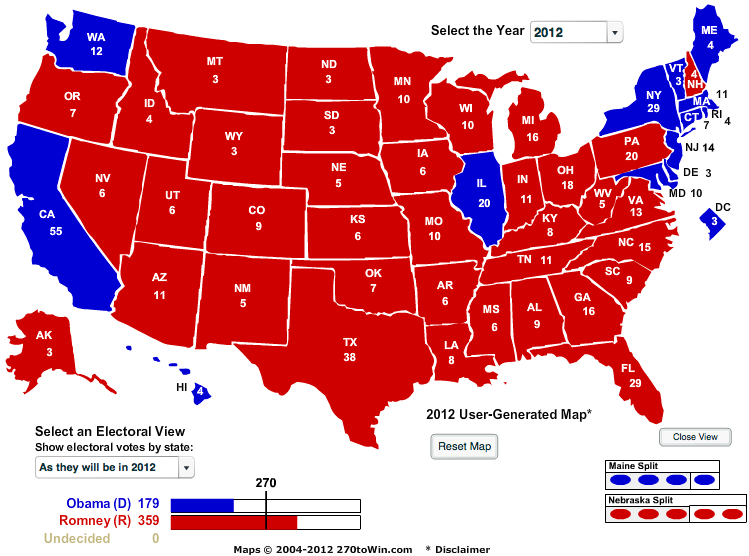JimBowie1958
Old Fogey
- Sep 25, 2011
- 63,590
- 16,753
- 2,220
I think that a comparison of how Rasmussen and Monmouth conduct their polling is illustrative of the complexities of polling, when done honestly, and how expected results can alter the end result.
First, Monmouth has Hillary up by 12, and they have tended to trend Hillary much higher than Trump all summer.
Monmouth University
The Monmouth University Poll was sponsored and conducted by the Monmouth University Polling Institute from October 14 to 16, 2016 with a national random sample of 805 registered voters. Interviews were conducted by a live caller in English, including 400 drawn from a list of registered voters (200 landline / 200 cell phone) and 405 using random digit dial (201 landline / 204 cell phone).
Then we have the Rasmussen methodology
Methodology - Rasmussen Reports™
Data for Rasmussen Reports survey research is collected using an automated polling methodology.
Generally speaking, the automated survey process is identical to that of traditional, operator-assisted research firms such as Gallup, Harris, and Roper. However, automated polling systems use a single, digitally-recorded, voice to conduct the interview while traditional firms rely on phone banks, boiler rooms, and operator-assisted technology.
Here is a huge difference right there. While Monmouth uses a real person to ask the questions that might shame some into not saying they are voting for Trump, more people have an easier time telling an automated voice what they plan to do.
For tracking surveys such as the Rasmussen Reports daily Presidential Tracking Poll, the automated technology ensures that every respondent hears exactly the same question, from the exact same voice, asked with the exact same inflection every single time.
Another huge difference here; how much does the polling caller influence the response when there is a "racist" politically unacceptable candidate involed with one of their supporters? Quite a bit of influence I would think.
All Rasmussen Reports' survey questions are digitally recorded and fed to a calling program that determines question order, branching options, and other factors. Calls are placed to randomly-selected phone numbers through a process that ensures appropriate geographic representation. Typically, calls are placed from 5 pm to 9 pm local time during the week. Saturday calls are made from 11 am to 6 pm local time and Sunday calls from 1 pm to 9 pm local time.
To reach those who have abandoned traditional landline telephones, Rasmussen Reports uses an online survey tool to interview randomly selected participants from a demographically diverse panel.
Another huge difference as not everyone has a landline any more, and using a survey tool like this can mix the numbers of voters without land lines in more evenly.
Rasmussen is also not calling only people who are registered. The Trump supporters who have not yet registered are not on the voting lists likely printed up and distributed from earlier this summer, and are not in Monmouth's lists as a result.
After the surveys are completed, the raw data is processed through a weighting program to ensure that the sample reflects the overall population in terms of age, race, gender, political party, and other factors. The processing step is required because different segments of the population answer the phone in different ways. For example, women answer the phone more than men, older people are home more and answer more than younger people, and rural residents typically answer the phone more frequently than urban residents.
For surveys of all adults, the population targets are determined by census bureau data.
While Monmouth does this as well, they dont give a lot of details about how they do it. "Trust in the Force Luke," right? With Rasmussen they go into the details and they do this job methodically and with a computer process designed to prevent influence by human factors like flawed expectations.
For political surveys, census bureau data provides a starting point and a series of screening questions are used to determine likely voters. The questions involve voting history, interest in the current campaign, and likely voting intentions.
Monmouth uses only registered voters as their criteria for "likely voters", which again ignores all the new voters that Trump is bringing into the system.
In addition to that, Trump voters are less likely to answer polls as they are alienated from the media in general as even FOX News has been going after their guy.
I think Rasmussens numbers are more accurate in this election and they still underestimate Trumps support by a good 5% to 10% due to politically correct shame, irritation.with the media, hiding their voting intentions from those who may over hear them responding to a poll.
If you look at the primaries and how inaccurate the polls were then, you notice that in all but two cases of the ones I gave here, they under estimated Trumps numbers by about 5% to 15% and in one case off by 33%!
Take one example, the NBC/Marist poll that claimed Trump had dropped to a 5% lead in South Carolina. Trump actually came away with a 10% majority. But Marist only uses registered voters in its sampling, so that might well explain the incongruity and their missing trumps margin of victory by 100%.
Clinton with Wide Lead over Trump Nationally | Home of the Marist Poll: Pebbles and Pundits
In a national survey conducted from Monday through Wednesday this week[†], Democrats Hillary Clinton and Tim Kaine, 48%, lead Republicans Donald Trump and Mike Pence, 33%, by 15 points among registered voters in the race for the White House.
This has been a regularly recurring phenomenon all year as polls of registered voters under estimate trumps vote by at least 5%.
I think that the majority of the differences we see in these polls show Trump apparently losing support when he is actually only seeing more of his voters shamed into not responding Truthfully.
So when you see these polls, if you want a more accurate reflection of the likely results, take Trumps percentage and add 5%.
First, Monmouth has Hillary up by 12, and they have tended to trend Hillary much higher than Trump all summer.
Monmouth University
The Monmouth University Poll was sponsored and conducted by the Monmouth University Polling Institute from October 14 to 16, 2016 with a national random sample of 805 registered voters. Interviews were conducted by a live caller in English, including 400 drawn from a list of registered voters (200 landline / 200 cell phone) and 405 using random digit dial (201 landline / 204 cell phone).
Then we have the Rasmussen methodology
Methodology - Rasmussen Reports™
Data for Rasmussen Reports survey research is collected using an automated polling methodology.
Generally speaking, the automated survey process is identical to that of traditional, operator-assisted research firms such as Gallup, Harris, and Roper. However, automated polling systems use a single, digitally-recorded, voice to conduct the interview while traditional firms rely on phone banks, boiler rooms, and operator-assisted technology.
Here is a huge difference right there. While Monmouth uses a real person to ask the questions that might shame some into not saying they are voting for Trump, more people have an easier time telling an automated voice what they plan to do.
For tracking surveys such as the Rasmussen Reports daily Presidential Tracking Poll, the automated technology ensures that every respondent hears exactly the same question, from the exact same voice, asked with the exact same inflection every single time.
Another huge difference here; how much does the polling caller influence the response when there is a "racist" politically unacceptable candidate involed with one of their supporters? Quite a bit of influence I would think.
All Rasmussen Reports' survey questions are digitally recorded and fed to a calling program that determines question order, branching options, and other factors. Calls are placed to randomly-selected phone numbers through a process that ensures appropriate geographic representation. Typically, calls are placed from 5 pm to 9 pm local time during the week. Saturday calls are made from 11 am to 6 pm local time and Sunday calls from 1 pm to 9 pm local time.
To reach those who have abandoned traditional landline telephones, Rasmussen Reports uses an online survey tool to interview randomly selected participants from a demographically diverse panel.
Another huge difference as not everyone has a landline any more, and using a survey tool like this can mix the numbers of voters without land lines in more evenly.
Rasmussen is also not calling only people who are registered. The Trump supporters who have not yet registered are not on the voting lists likely printed up and distributed from earlier this summer, and are not in Monmouth's lists as a result.
After the surveys are completed, the raw data is processed through a weighting program to ensure that the sample reflects the overall population in terms of age, race, gender, political party, and other factors. The processing step is required because different segments of the population answer the phone in different ways. For example, women answer the phone more than men, older people are home more and answer more than younger people, and rural residents typically answer the phone more frequently than urban residents.
For surveys of all adults, the population targets are determined by census bureau data.
While Monmouth does this as well, they dont give a lot of details about how they do it. "Trust in the Force Luke," right? With Rasmussen they go into the details and they do this job methodically and with a computer process designed to prevent influence by human factors like flawed expectations.
For political surveys, census bureau data provides a starting point and a series of screening questions are used to determine likely voters. The questions involve voting history, interest in the current campaign, and likely voting intentions.
Monmouth uses only registered voters as their criteria for "likely voters", which again ignores all the new voters that Trump is bringing into the system.
In addition to that, Trump voters are less likely to answer polls as they are alienated from the media in general as even FOX News has been going after their guy.
I think Rasmussens numbers are more accurate in this election and they still underestimate Trumps support by a good 5% to 10% due to politically correct shame, irritation.with the media, hiding their voting intentions from those who may over hear them responding to a poll.
If you look at the primaries and how inaccurate the polls were then, you notice that in all but two cases of the ones I gave here, they under estimated Trumps numbers by about 5% to 15% and in one case off by 33%!
Take one example, the NBC/Marist poll that claimed Trump had dropped to a 5% lead in South Carolina. Trump actually came away with a 10% majority. But Marist only uses registered voters in its sampling, so that might well explain the incongruity and their missing trumps margin of victory by 100%.
Clinton with Wide Lead over Trump Nationally | Home of the Marist Poll: Pebbles and Pundits
In a national survey conducted from Monday through Wednesday this week[†], Democrats Hillary Clinton and Tim Kaine, 48%, lead Republicans Donald Trump and Mike Pence, 33%, by 15 points among registered voters in the race for the White House.
This has been a regularly recurring phenomenon all year as polls of registered voters under estimate trumps vote by at least 5%.
I think that the majority of the differences we see in these polls show Trump apparently losing support when he is actually only seeing more of his voters shamed into not responding Truthfully.
So when you see these polls, if you want a more accurate reflection of the likely results, take Trumps percentage and add 5%.




